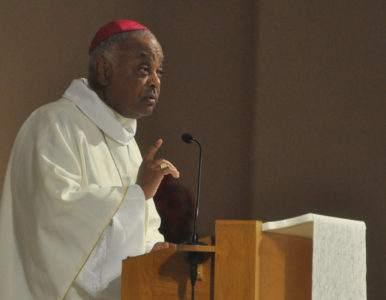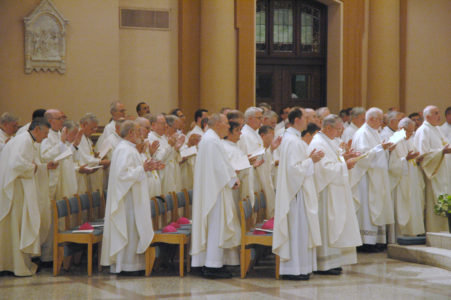(Editor’s note: Bishop Joseph Kopacz participated in this Mass during the U.S. Conference of Catholic Bishop’s gathering. See related stories on pages 1 and 3.)
WASHINGTON – As they began the spring general assembly, bishops from across the U.S. gathered June 14 at Sts. Peter and Paul Cathedral in Indianapolis for a Mass of Prayer and Penance for survivors of sexual abuse within the Church. The Mass was held in response to a call from Pope Francis for all episcopal conferences across the world to have a Day of Prayer and Penance for victims of sexual abuse within the Church.
The bishops gathered together in solidarity to pray for victims and to acknowledge the pain caused by the failures of the Church in the past. The Mass marked the opening for the June plenary assembly of bishops held June 14-15 in Indianapolis.
Cardinal Daniel N. DiNardo, of the Archdiocese of Galveston-Houston and president of the U.S. Conference of Catholic Bishops, was the principal celebrant.

Atlanta Archbishop Wilton D. Gregory delivers the homily during Mass June 14 at SS. Peter and Paul Cathedral in Indianapolis during the U.S. Conference of Catholic Bishops’ annual spring assembly. (CNS photo/Sean Gallagher, The Criterion)
Archbishop Wilton D. Gregory, of Atlanta, and former president of the USCCB, was the homilist.
Following is the full text of Archbishop Gregory’s homily.
In the very same chapter of his Gospel in which St. Matthew presents his rendition of the Beatitudes, Jesus tells us that He has not come to abolish the law but to fulfill it. Clearly, the Beatitudes are in fact a startling new edition of God’s Law. Jesus is Himself both the new law and the fulfillment of the old law. He calls us to see with new eyes how to live in a world so continually filled with sorrow, injustice and violence and how important it is to acknowledge our own share in causing or compounding the sorrows, suffering and violence that often seem to surround us.
We bishops have learned a great deal about the sorrow and pain of those we love and serve, even as we have to acknowledge humbly, publicly and pitifully our share in bringing much of that pain to bear. We feel, we see, we live with, as they do in much greater measure, the impact of behaviors, responses and revelations that have no place in Matthew’s Gospel, in the Beatitudes, or in the narrative of Jesus’ promise to fulfill God’s Law. And yet only there, by His Grace and His unwavering example, can we begin to learn to heal and to reconcile — to bind the wounds and to assuage the sorrow. We recognize this even as Paul reminds us that we have been qualified for this ministry only by God’s purpose and designation.
Pope Francis has summoned us as bishops to find occasions and opportunities to pray earnestly for God’s grace to bring about the healing and the reconciliation of those who have been harmed in this tragedy that has hurt far too many of His people and far too much of His Church. The Holy Father has called us respectfully to acknowledge our own share in causing the pain that so many are still enduring.
At this Mass, we bishops humbly and sincerely ask for the forgiveness of those who have been harmed, scandalized or dispirited by events that, even if they happened many years ago, remain ongoing sources of anguish for them and for those who love them. We humbly seek forgiveness from the faith-filled people of our Church and from our society at-large — and especially from those whose lives may have been devastated by our failure to care adequately for the little ones entrusted to us and for any decision that we made or should have made that exacerbated the sorrow and heartache that the entire Church has felt and continues to feel — for what we have done, and for what we have failed to do. We can never say that we are sorry enough for the share that we have had in this tragedy of broken fidelity and trust.

Clergymen pray during Mass at the U.S. Conference of Catholic Bishops’ annual spring assembly June 14 at SS. Peter and Paul Cathedral in Indianapolis. (CNS photo/Mike Krokos, The Criterion)
With hearts that are contrite we ask the forgiveness of God, our Almighty Father, under whose purpose and designation we are entrusted with this ministry, and whom we disgrace most profoundly when we fall so woefully short.
There have been many procedural and educational expressions of our commitment to reform and renewal that have been put into place in the past 15 years. They are sincere, state-of-the-art, and effective. Nevertheless, this expression of our sorrow is far more important at this time, in this place, than any administrative process or training effort, however beneficial to the Church and to the world.
While we have had many opportunities to pray in our own dioceses with survivors, their families and our people, we gather this evening as a community of bishops to pray together for the grace of healing and reconciliation that only the Lord Jesus Himself can bestow upon His Church. While there is still more, always more, that must and will be done to assure our people of our dedication and commitment to safeguarding the innocent lives of our young and vulnerable faithful, this evening we acknowledge that ultimately it must be the Lord Himself who heals and reconciles the hearts of those who live with the pain of God’s law unheeded.
For that Grace, with sincere hearts, with contrite spirits and with a renewed promise to protect, we simply pray this evening. Amen

Clergymen pray during Mass at the U.S. Conference of Catholic Bishops’ annual spring assembly June 14 at SS. Peter and Paul Cathedral in Indianapolis. (CNS photo/Mike Krokos, The Criterion)
